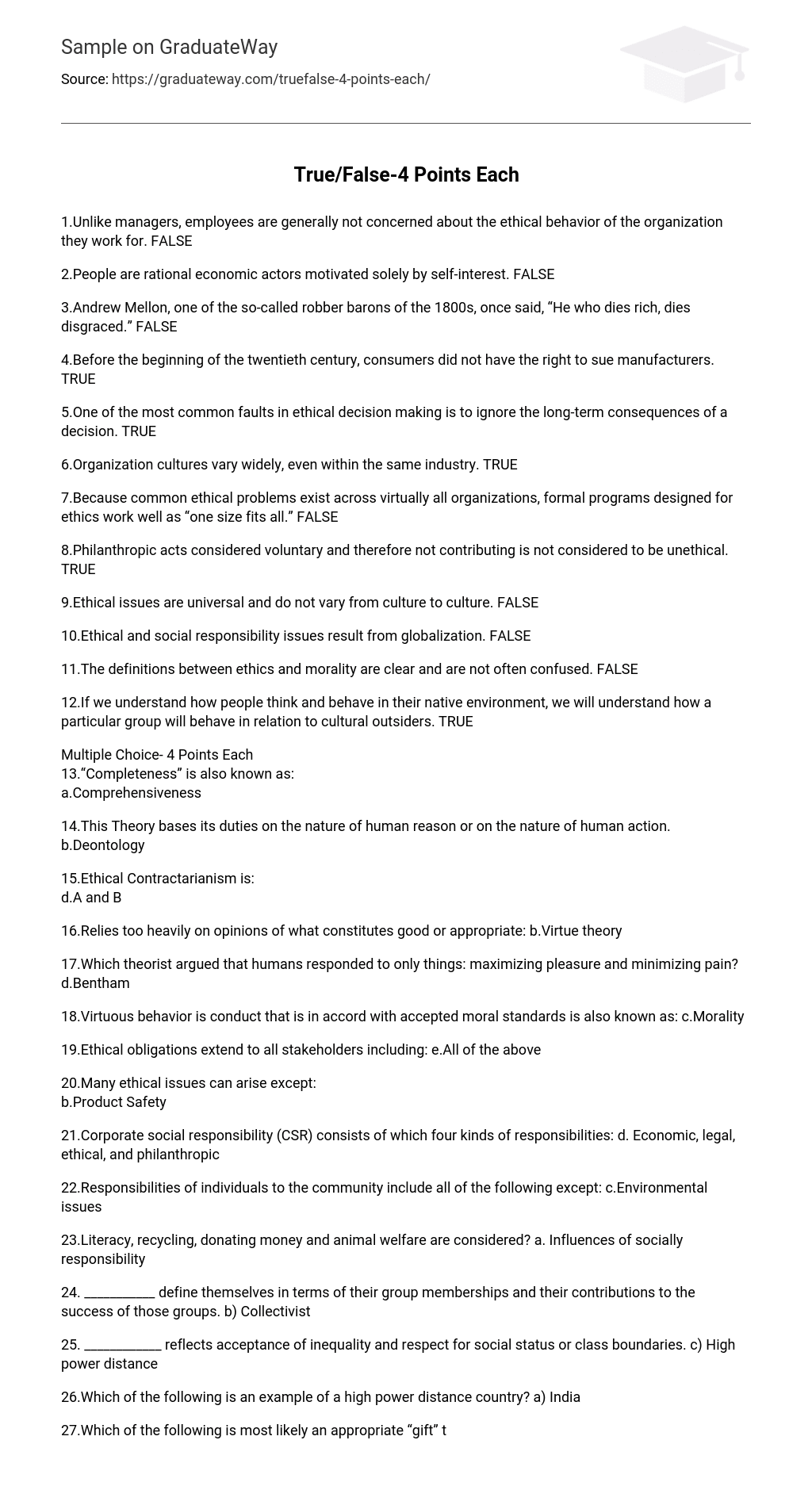1.Unlike managers, employees are generally not concerned about the ethical behavior of the organization they work for. FALSE
2.People are rational economic actors motivated solely by self-interest. FALSE
3.Andrew Mellon, one of the so-called robber barons of the 1800s, once said, “He who dies rich, dies disgraced.” FALSE
4.Before the beginning of the twentieth century, consumers did not have the right to sue manufacturers. TRUE
5.One of the most common faults in ethical decision making is to ignore the long-term consequences of a decision. TRUE
6.Organization cultures vary widely, even within the same industry. TRUE
7.Because common ethical problems exist across virtually all organizations, formal programs designed for ethics work well as “one size fits all.” FALSE
8.Philanthropic acts considered voluntary and therefore not contributing is not considered to be unethical. TRUE
9.Ethical issues are universal and do not vary from culture to culture. FALSE
10.Ethical and social responsibility issues result from globalization. FALSE
11.The definitions between ethics and morality are clear and are not often confused. FALSE
12.If we understand how people think and behave in their native environment, we will understand how a particular group will behave in relation to cultural outsiders. TRUE
Multiple Choice- 4 Points Each
13.“Completeness” is also known as:
a.Comprehensiveness
14.This Theory bases its duties on the nature of human reason or on the nature of human action. b.Deontology
15.Ethical Contractarianism is:
d.A and B
16.Relies too heavily on opinions of what constitutes good or appropriate: b.Virtue theory
17.Which theorist argued that humans responded to only things: maximizing pleasure and minimizing pain? d.Bentham
18.Virtuous behavior is conduct that is in accord with accepted moral standards is also known as: c.Morality
19.Ethical obligations extend to all stakeholders including: e.All of the above
20.Many ethical issues can arise except:
b.Product Safety
21.Corporate social responsibility (CSR) consists of which four kinds of responsibilities: d. Economic, legal, ethical, and philanthropic
22.Responsibilities of individuals to the community include all of the following except: c.Environmental issues
23.Literacy, recycling, donating money and animal welfare are considered? a. Influences of socially responsibility
24. ___________ define themselves in terms of their group memberships and their contributions to the success of those groups. b) Collectivist
25. ____________ reflects acceptance of inequality and respect for social status or class boundaries. c) High power distance
26.Which of the following is an example of a high power distance country? a) India
27.Which of the following is most likely an appropriate “gift” to accept from a vendor? b) Dinner for you and your wife at Applebee’s
Fill in the Blanks- 4 Points Each
28.Who has both legal responsibilities as well as ethical ones? Organizations
29.Corporate governance and accounting reform is also known as: Sarbanes-Oxley Act.
30.Fines for failure to meet compliance laid out by the U.S. Sentencing Commission in their U.S. Sentencing Guidelines.
31.The New York Stock Exchange passed reform requiring code of conduct for members.
32.Ethics refers to well-founded standards of right and wrong that prescribe what humans ought to do, usually in terms of rights, obligations, benefits to society, fairness, or specific virtues.
33.According to the Corporate Social Responsibilities (CSR) pyramid, the economic responsibility is considered to be of primary importance to organizations.





